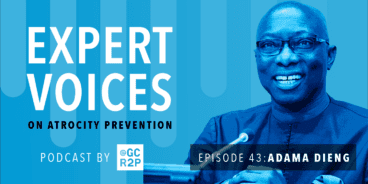
Atrocity Alert No. 57: Philippines, Egypt and South Sudan
Atrocity Alert is a weekly publication by the Global Centre for the Responsibility to Protect highlighting situations where populations are at risk of, or are enduring, mass atrocity crimes.
Philippines
On 23 May fighting began between government security forces and several armed groups aligned with the so-called Islamic State of Iraq and the Levant (ISIL) in Marawi, Philippines, on the southern island of Mindanao. Clashes broke out after government forces attacked a group of Abu Sayyaf militants said to be protecting Isnilon Hapilon, their leader and the declared “emir” of ISIL in Southeast Asia. Members of aligned armed groups, primarily the Maute group, quickly overtook portions of the city, burning churches, schools and government buildings. Religiously-motivated violence has been reported, including the kidnapping of a priest and the execution of at least eight people believed to be Christians at a Maute checkpoint. Over 180,000 residents of Marawi have fled the violence.
President Rodrigo Duterte responded by ordering airstrikes and declaring martial law on Mindanao. President Duterte has also announced that he will consider expanding martial law to the rest of the Philippines and has made comments that appear to endorse rape by soldiers deployed to retake Marawi.
Given President Duterte’s so-called “war on drugs,” which has resulted in the killing of almost 9,000 people since June 2016, the expansion of martial law could put more civilians at risk of arbitrary detention, sexual violence or extrajudicial killing at the hands of security forces. While the government of the Philippines has sovereign authority to maintain law and order within its borders, including defending its population from the threat of terrorism and illegal drugs, they are obligated to do so with respect to international human rights law.
Egypt
On 26 May armed gunmen in Egypt ambushed a convoy of Coptic Christians en route to the Saint Samuel Monastery near the city of Minya, killing 29 people. The dead included a number of children.
This is the fourth major terrorist attack against the Coptic Christian community in Egypt since December 2016. All of the attacks have been claimed by ISIL. The most deadly attack took place on 9 April when suicide bombings in two Coptic churches packed with Palm Sunday worshipper, killed 49 people. In response to the Palm Sunday attack, President Abdel Fatteh el-Sisi announced a three-month state of emergency.
Coptic Christians constitute the majority of Egypt’s 9 million Christians, making up roughly 10 percent of the population. ISIL’s terrorist campaign deliberately targets the Coptic Christian minority and seeks to foment sectarian violence in Egypt. The Coptic community has criticized the government for not adequately delivering on promises of enhanced protection despite the state of emergency, alleging long-standing prejudices against them.
South Sudan
On 30 May a military court in South Sudan began the trial of thirteen soldiers from the Sudan People’s Liberation Army (SPLA) accused of rape and murder at the Terrain Hotel in Juba on 11 July 2016. In the midst of several days of renewed heavy fighting between the SPLA and armed rebels, a group of 80-100 SPLA soldiers entered the Terrain Hotel, where they looted property and abused residents and staff. At least seven women, including several international humanitarian workers, were raped by SPLA soldiers while an ethnic Nuer journalist was shot dead.
The trial is a notable attempt to end impunity for widespread sexual violence in South Sudan. Holding perpetrators of sexual violence accountable is vital to deliver justice to the victims and to deter future crimes. The government of South Sudan, together with the African Union, should therefore expedite the establishment of the Hybrid Court for South Sudan, in accordance with the 2015 Peace Agreement, “to investigate and prosecute individuals bearing responsibility for violations of international law and/or applicable South Sudanese law.” Perpetrators, regardless of position or affiliation, must be held accountable for war crimes and crimes against humanity committed in South Sudan, including widespread rape and other forms of sexual violence.
Related Publications


Atrocity Alert No. 434: Sudan, Ethiopia and the UN Human Rights Council
